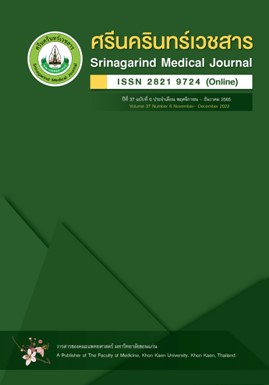The Effectiveness of the New Normal of Care System for People with Mental Health Problems from COVID-19 Pandemic
Keywords:
COVID-19, mental health care system, mental health problemsAbstract
Background and Objective: The COVID-19 outbreak has a tremendous impact on physical, mental and social wellbeing. The department of mental health has developed a policy and plan of care system for people with mental health problems from the pandemic situation.
Methods: The evaluation research on the system effectiveness using CIPP model, mixed methods focusing on qualitative and quantitative methods respectively, was conducted with total study population (n=303) divided by 55 samples using in-depth interview and 248 samples using the online questionnaire. The content analysis and descriptive statistics were used for analyzing data.
Results: The study samples were mostly female, mean age 30 years, married, undergraduate education and having regular income. From context domain, people using mental health check in assessment of their mental status during May 1st 2020 - March 31st 2021 were found to have stress risk 7.65%, depression 9.07% and suicidality 5.01%. Psychosocial care system was well- implemented in the policy under the provincial Emergency Operation Center.From input domain, there were not enough mental health communication in a policy level and few budgets were allocated for crisis mental health service. The inadequate quantity and capacity of mental health professional has affected the care process due to overwhelming physical issues. Overall, the system was effective, most were mental health check in application screening, telephone counseling and the health professional care consequently. Most outcome indicators were achieved. Despite the crisis care, increasing suicide rate suggest the ongoing surveillance on this issue.
Conclusion: The effectiveness system was on the holistic care policy, the self-assessment application and the service from mental team. There is a need for evaluation on the long-term impact of COVID-19 on the psychosocial recovery.
References
Zhang Y, Ma ZF. Impact of the COVID-19 Pandemic on Mental Health and Quality of Life among Local Residents in Liaoning Province, China: A Cross-Sectional Study. Int J Environ Res Public Health 2020;17(7):2381.
Patel PC, Rietveld CA. The impact of financial insecurity on the self-employed’s short-term psychological distress: evidence from the COVID-19 pandemic. J Bus Ventur Insights 2020;14:e002062020.
World Health Organization. COVID-19 pandemic triggers 25% increase in prevalence of anxiety and depression worldwide. [press release], 2022. [cited November 20, 2022] Available from: https://www.who.int/news/item/02-03-2022-covid-19-pandemic-triggers-25-increase-in-prevalence-of-anxiety-and-depression-worldwide.
Ahmed MZ, Ahmed O, Aibao Z, Hanbin S, Siyu L, Ahmad A. Epidemic of COVID-19 in China and associated psychological problems. Asian J Psychiatr 2020;51:102092.
Nagelhout GE, Hummel K, de Goeij MCM, de Vries H, Kaner E, Lemmens P. How economic recessions and unemployment affect illegal drug use: a systematic realistic literature review. Int J Drug Policy 2017;44:69–83.
Milner A, Page A, LaMontagne A.Long-term unemployment and suicide: a systematic review and meta-analysis. PLoS One 2013;8:e51333. doi: 10.1371/journal.pone.0051333
Mann FD, Krueger RF, Vohs KD. Personal economic anxiety in response to COVID-19. Pers Individ Dif 2020;167:110233.
Salameh P, Hajj A, Badro DA, Abou Selwan C, Aoun R, Sacre H. Mental health outcomes of the COVID-19 pandemic and a collapsing economy: perspectives from a developing country. Psychiatry Res 2020;294:113520.
Hu Y, Qian Y. COVID-19 and adolescent mental health in the United Kingdom. J Adolesc Health 2021;69:26–32.
Ribeiro F, Schröder V, Krüger R, Leist AK. The evolution and social determinants of mental health during the first wave of the COVID-19 outbreak in Luxembourg. Psychiatry Res 2021;303:114090.
Shammi M, Bodrud-Doza M, Towfiqul Islam ARM, Rahman MM.COVID-19 pandemic, socioeconomic crisis and human stress in resource-limited settings: A case from Bangladesh. Heliyon 2020;6:e04063.
Van Bavel JJ, Baicker K, Boggio PS, Capraro V, Cichocka A, Cikara M. Using social and behavioural science to support COVID-19 pandemic response. Nat Hum Behav 2020;4:460–71.
Dlugosz P. Factors influencing mental health among American youth in the time of the Covid-19 pandemic. PersonalIndivid Differ 2021;175:110711.
Liu X, Chen J, Wang D, Li X, Wang E, Jin Y. COVID-19 outbreak can change the job burnout in health care professionals. Front Psychiatry 2020;11:563781.
Tee M, Wang C, Tee C, Pan R, Reyes P.W, Wan X. Impact of the COVID-19 pandemic on physical and mental health in lower and upper middle-income Asian countries: A comparison between the Philippines and China. Front Psych 2021;11:1631.
Han Q, Zheng B, Agostini M, Bélanger JJ, Gützkow B, Kreienkamp J. Associations of risk perception of COVID-19 with emotion and mental health during the pandemic. J Affect Disord 2021;284:247–55.
Gao J, Zheng P, Jia Y, Chen H, Mao Y, Chen S, et al. Mental health problems and social media exposure during COVID-19 outbreak. PLoS One 2020;15(4):e0231924.
Hou R, Yang L, Tang Z, Chen T. Caring for patients in mental health services during COVID-19 outbreak in China. Ann Gen Psychiatry 2020;19(1):1-3.
Xiang YT, Yang Y, Li W, Zhang L, Zhang Q, Cheung T. Timely mental health care for the 2019 novel coronavirus outbreak is urgently needed. Lancet Psychiatry 2020;7:228–9.
Downloads
Published
How to Cite
Issue
Section
License
Copyright (c) 2022 Srinagarind Medical Journal

This work is licensed under a Creative Commons Attribution-NonCommercial-NoDerivatives 4.0 International License.




